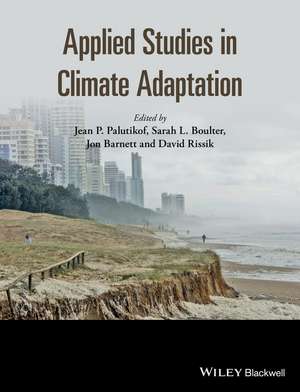Applied Studies in Climate Adaptation
Autor JUL Palutikofen Limba Engleză Hardback – 25 dec 2014
Preț: 577.90 lei
Preț vechi: 815.44 lei
-29% Nou
Puncte Express: 867
Preț estimativ în valută:
110.66€ • 114.02$ • 92.86£
110.66€ • 114.02$ • 92.86£
Carte indisponibilă temporar
Doresc să fiu notificat când acest titlu va fi disponibil:
Se trimite...
Preluare comenzi: 021 569.72.76
Specificații
ISBN-13: 9781118845011
ISBN-10: 1118845013
Pagini: 496
Dimensiuni: 191 x 252 x 27 mm
Greutate: 1.23 kg
Editura: Wiley
Locul publicării:Chichester, United Kingdom
ISBN-10: 1118845013
Pagini: 496
Dimensiuni: 191 x 252 x 27 mm
Greutate: 1.23 kg
Editura: Wiley
Locul publicării:Chichester, United Kingdom
Public țintă
All of the 148 project reports are freely available on the web in their original form. However, the great value of the proposed book is that it will bring together, organise and evaluate the core material from the most globally relevant of these projects. Authors will be asked to write their contributions taking into account the global nature of their audience using the example of Australia to draw globally–relevant conclusions. The intended audience for the book is decision makers working in climate change adaptation, primarily at all levels of government from international to local, but also in the private sector.The expectation is that the book will make a substantial contribution to global thinking around adaptation and, this being the case, the book will also be read by researchers working in adaptation. There is clear potential for it to become a set text for undergraduate and Masters courses in Environmental Sciences, Planning and Climate Change.
Cuprins
Notă biografică
Jean Palutikof is the Director of the National Climate Change Adaptation Research Facility (NCCARF) where she has built a national program of adaptation research, communication and partnerships. Prior to joining NCCARF she managed the production of the Intergovernmental Panel on Climate Change (IPCC) Fourth Assessment Report for Working Group II (Impacts, Adaptation and Vulnerability). Her research interests focus on climate change impacts, and the application of climatic data to economic and planning issues. Sarah Boulter is a Research Fellow with NCCARF where she works on synthesis and communication of adaptation research. Her research background includes studies of biodiversity and reproductive ecology of forested systems and the impacts of climate change. Jon Barnett is a Professor and Australian Research Council Future Fellow in Geography at The University of Melbourne. He is a political geographer who researches the impacts of and responses to environmental change on social systems in Australia, East Asia and the South Pacific. David Rissik is Deputy Director (General Manager) of the National Climate Change Adaptation Research Facility responsible for the day-to-day management of the Facility and the Synthesis and Integrative Research Program. He has interest and experience in the delivery of applied research to practitioners in ways that are easily accessible and useful. His research background is in coastal and estuarine ecology and management.
Descriere
The book advances knowledge about climate change adaptation practices through a series of case studies. It presents important evidence about adaptation practices in agriculture, businesses, the coastal zone, community services, disaster management, ecosystems, indigneous populations, and settlements and infrastructure.
